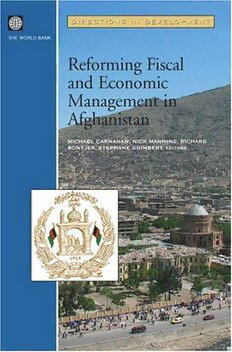
Reforming Fiscal and Economic Management in Afghanistan PDF
180 Pages·2004·0.87 MB·English
Most books are stored in the elastic cloud where traffic is expensive. For this reason, we have a limit on daily download.
Preview Reforming Fiscal and Economic Management in Afghanistan
Description:
Ministers of Finance in post-conflict countries face unique challenges. At a turbulent time when both financial and human resources are limited, what should a finance ministry do - and, more importantly, not do? Which countries offer successful examples of reform that can be used as models for finance ministry reform in other countries? Reforming Fiscal and Economic Management in Afghanistan sets out the impressive policy and institutional reforms made by the interim and transitional administrations of Afghanistan since the Bonn conference in November 2001. It explores the complexities of managing the significant amount of development assistance and donor interest while balancing the need to respond to donor priorities and to build strong public-sector institutions. The book demonstrates that the budget must be the primary vehicle for developing and then implementing policy, and shows how this strategy has shaped the renewal of Afghanistan's finance ministry. The volume closes with a specific agenda for finance ministry reform and restructuring. Although this edited volume is focused on Afghanistan, the questions raised have broad relevance for other countries seeking to restart economic and fiscal management following conflict. Reforming Fiscal and Economic Management in Afghanistan will be of great interest to finance ministries, national governments, international and nongovernmental organizations, and research institutions, and to anyone interested in post-conflict reconstruction and reform.
See more
The list of books you might like
Most books are stored in the elastic cloud where traffic is expensive. For this reason, we have a limit on daily download.
